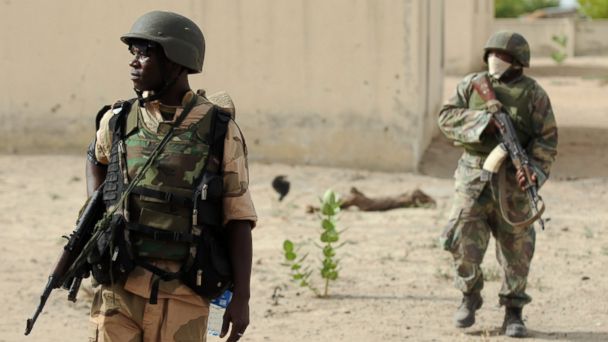Nigerian Military Human Rights Abuses Won't Stop American Search Assistance, Official Says

(Quentin Leboucher/AFP/Getty Images)
An American law that prevents the United States from helping foreign security forces guilty of human rights abuses applies to parts of the Nigerian military but doesn't affect U.S. efforts to find the girls kidnapped by Boko Haram, a senior State Department official said today.
The so-called "Leahy Law" does, in fact, bar the U.S. from giving training and other assistance to specific units in the Nigerian military, including, the official said, one counterterrorism unit.
But, the official added, "we separate that specific from our ability to help now."
"We are doing human rights training and appropriate use of force [training] with the military for those elements that we can work with," the official said on a conference call with reporters.
The official underscored that the U.S. still has concerns about Nigeria's human rights record.
Amnesty International government relations manager Adotei Awkei told ABC that the Nigerian military has likely been involved in the disappearances of hundreds or even thousands of people in Northern Nigeria, and that there is evidence of military camps used to torture people and mass graves in which large numbers of Muslim men may have been dumped.
Awkei added that the Leahy Law has "been a major source of frustration for the Nigerians, who've wanted U.S. assistance."
A 2013 State Department inspector general report found that the U.S. embassy in Nigeria rejected or suspended 211 out of 1,377 applications for training that year because of human rights concerns.
In addition to ongoing military training, the official also expanded on what some of the five State Department officials on the ground in Nigeria will be doing to help in the search.
Two of them are strategic communications experts who will be helping the Nigerians keep citizens informed.
"We were all extremely surprised by the dearth of communication that was coming out about this event," the official said. "The Nigerian government said that they were doing more than they were expressing."
There was also a civilian security expert on the ground who will be helping set up early warning systems in communities across the country, especially those that are isolated or don't have a robust security presence, the official said.
An Amnesty International report found that Nigerian security forces ignored warnings that Boko Haram was coming for the girls on the night of April 14.
There are now 26 U.S. government employees helping with the search: the five State Department officials, 10 Department of Defense planners who had already been in Nigeria; seven additional DOD advisers from AFRICOM, and four FBI officials with expertise in safe recovery, negotiations and preventing future kidnappings.
Some on the team are trained trauma counselors and specialists who deal with kidnapping and hostage taking, Deputy Assistant Secretary for African Affairs Bissa Williams said Tuesday, adding that the parents of the girls, girls who have already escaped and others who might be rescued will need counseling.
The U.S. experts are working with the Nigerian government to provide expertise and counseling to the local government officials who will be dealing with the girls and their families.
Of the search itself, the official had no updates on the location of the kidnapped girls.
"We really don't know where the girls are," the official said.
ABC News' Lee Ferran contributed to this report.